LATEST NEWS


Walmart soon turns 50. What better time for a makeover, a little freshening up –a rebranding, perhaps? Maybe a new look to go along with a move from the ‘burbs to the Big City.
The Big W is hoping a fresh face will help as it moves to crack an urban market worth as much as $100 billion. Walmart has overbuilt in rural and suburban areas to the point of cannibalization, one Walmart Supercenter devouring the profits of the other. The loser is left to die—and the vacant space is left to whatever retailer can afford to move in (and is not a Walmart competitor) A PBS documentary reported in 2001 that Walmart had left behind more than 25 million square feet of unoccupied space across the country.
Walmart U.S President and CEO Bill Simon rolled out the makeover concept last year at the Bank of America Merrill Lynch Consumer Conference.
» Read more about: Walmart at 50: Still Greedy After All These Years »


Last week the activist right-wing majority of the United States Supreme Court –in a radical departure from well-settled jurisprudence — further weakened the ability of labor unions to engage in meaningful political activity. The decision has been largely overshadowed by the Court’s ruling on Arizona’s S.B. 1070, and by its anticipated ruling on the Affordable Care Act. Yet, as far as the viability of the labor movement is concerned, the significance of this decision can scarcely be overstated.
In Knox v. SEIU, Local 1000, the majority opinion displayed an unprecedented level of concern for the First Amendment rights of a minority of public-sector employees – but only insofar as those rights limit the ability of labor unions to speak politically. The case arose from SEIU’s state-wide response to several anti-union voter propositions in California. The initiatives were announced after the union had already determined and sent out notices for dues for the coming year.
» Read more about: Crass Warfare: Supreme Court Attacks Unions »


(This post first appeared on the Drucker Exchange, a daily blog produced by the Drucker Institute at Claremont Graduate University. It appears here with permission.)
The man who proved Karl Marx wrong was, according to Peter Drucker, American management expert Frederick Taylor.
Taylor had the insight that factory workers could be made more productive through improvements in technology and management—rather than merely through longer, harder hours. What’s more, those workers could share in the fruits of growth.
“Without Taylor, the number of industrial workers would still have grown fast, but they would have been Marx’s exploited proletarians,” Drucker wrote in The New Realities. “Instead, the larger the number of blue-collar workers who went into the plants, the more they became ‘middle class’ and ‘bourgeois’ in their incomes and their standards of living.”
For the past 30 years,
» Read more about: Stagnant Wages: Rich Man, Poor Man, Poorer Man »


The wealthiest Americans have a long-held delusion, passed along through their media outlets to the rest of us, that they pick up the bill for most of our country’s needs, and that middle-class public workers and unions benefit from their generosity. But facts, not emotions, are needed to provide the truth. And there are plenty of eye-opening facts that refute the far-right claims.
Fact #1: Government employees make up 16.7% of U.S. employees and receive 17.6% of the pay.
The public vs. private “who gets higher pay?” battle has convincing arguments on both sides. Yet a careful analysis of Census Department data confirms that government employees earn less than 1% more than private sector employees. Recent (2009) compensation figures reveal that:
» Read more about: Mythbusters: The Legend of Overpaid Public Workers »
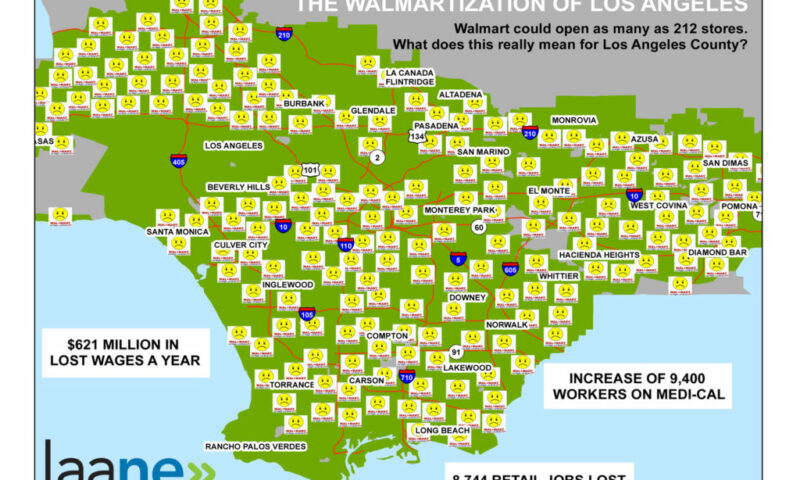

Maybe you will be one of the 10,000 people expected at a June 30th protest in L.A.’s Chinatown against a controversial plan to open a Walmart store there. The uber-retailer’s reputation for wrecking the atmosphere of historic districts like Chinatown, and posing a potential threat to local businesses, has generated strong resistance to plans for a 33,000 square-foot “express” Walmart at Cesar Chavez and Grand avenues.
The fight isn’t only about Chinatown–it’s about all of Los Angeles, because Walmart may be coming to a corner near you. Walmart has designs on locations around L.A. County to gain a foothold in the local urban grocery market.
The retailing behemoth needs to shore up sagging sales and stagnating stock prices, which requires expansion into U.S. urban markets. (Rural and suburban areas across the country have reached the Walmart saturation point.) But Walmart has encountered stubborn opposition in urban centers where residents take issue with its penchant for keeping its employees in low-wage,
Few American institutions have been subjected to such a consistent stream of vitriol and assault as the minimum wage, which celebrates its 74th birthday this week. The first federal minimum wage was established when FDR signed the Fair Labor Standards Act (FLSA) on June 25, 1938. The FLSA also established the eight-hour day, paid overtime and child labor protections into federal law. Since then, it has been amended nine times to expand coverage and to raise the wage to keep it in line with the nation’s economic growth.
Business leaders, industry associations, politicians and more recently think tanks have opposed the FLSA and every legislative amendment since. They said it would destroy American civilization, kill jobs and hurt black people. Business owners predicted they would be forced into bankruptcy.
One business opponent of the 1938 legislation even warned that the minimum wage would lead to the decline of the American empire.
» Read more about: Minimum Wage Doomsayers Still Wrong After 74 Years »


RePower LA’s proposal “appears to be one of those rare public policy ideas that generates not only broad, but enthusiastic support from the electorate. Voters appreciate that it not only creates needed jobs, opportunities with union benefits, but it does so while cleaning our air, reducing electricity bills for 10,000 homes and businesses a year, and lowering electricity generating costs for generations


Art allows us to peer into the lives of people we may ordinarily not cross paths with and see the world through their eyes. LAANE’s Construction Careers project did exactly that last night at its photography exhibit and mixer at the Solidarity Ink gallery space in Lincoln Heights. Sixty InterAct members and community leaders mingled with construction workers in a melting pot of wine, cheese and art-gazing.
The goal: to holistically present the lives of ordinary people in the hard-construction industry. We wanted to paint a broad picture of workers from diverse backgrounds, showing them in their homes, neighborhoods and worksites. We strove to portray workers with a sense of grace, documenting intimate moments with their families and the pride that they take every day, in the words of several workers, in “building something that will last.”
The multifaceted realities of Tarita, Luis, Stefanie, and Jabari – four workers from different ethnicities,


Reading [Robert] Caro’s biographies of LBJ has become a multi-generational experience in our family. At 15, my son, who had never read anything more than Harry Potter, became enthralled with them, devouring the first three. This year, he bought the newest volume as my birthday present, I got my dad the book for Father’s Day, and my dad gave the book to my son for his birthday.
Much of our great fascination with Lyndon Johnson is the duality of his character: willing to lie and cheat, devoid of any principles on his path to power, and then as president, using that power to achieve lofty, principled goals that transformed our nation forever.
As Caro describes in the latest volume, The Passage of Power, as LBJ was preparing to address Congress just after assuming the presidency, “a fierce debate” between his advisors “erupted – over the emphasis to be given in the speech to civil rights.” As the discussion went on until 2:30 in the morning,


In mid-May, the management at Paleteria La Michoacana ice cream fired long-time delivery drivers, merchandisers, office workers and warehousemen at the Gardena and Modesto facilities, despite the fact that the boss, Ignacio Gutierrez, told employees earlier this year that his company is growing and profitable. The employee terminations occurred nearly on the eve of the scheduled Teamster representation election date.
Rick Middleton, Secretary-Treasurer of Teamsters Local 572 in Carson:
“The National Labor Relations Act (NLRA) is under attack. This means Americans are under attack. This employer is blatantly showing a disregard for our laws. We are a country of laws – we respect our laws. No man, no company is above the law.”
The union has since filed charges against the company with the NLRA.
Join Teamsters and labor union supporters at our rally on Tuesday, June 26th in Modesto to protest the unlawful firing of workers at Michoacana.
» Read more about: Ice Cream Workers Fired Before Contract Vote »


(Editor’s Note: A slightly longer version of this post originally appeared in Dissent.)
Last month Wal-Mart became the latest company to drop its membership in the American Legislative Exchange Council in response to public outrage over ALEC’s aggressive support for “Stand Your Ground” laws (which are implicated in the death of Trayvon Martin, among others). Wal-Mart won some kudos for leaving ALEC, but its shrewd move was nothing more than an attempt to divert attention from the retail giant’s current troubles and its multimillion dollar effort to burnish its image, peddle its influence, and increase its market share.
The uproar over the Wal-Mart bribery scandal in Mexico uncovered last month evokes the famous distinction between “dishonest graft” and “honest graft” made by George Washington Plunkitt, a Tammany Hall politician in the early 1900s. Dishonest graft, Plunkitt explained, involves bribes and blackmail.


It was Grover Norquist who famously said he wanted to shrink government to a size where he could drown it in a bathtub. Norquist’s Paulist allies in Congress (Ron Paul, Rand Paul, Paul Ryan) show no interest in stopping there, however, and probably would go after the bathtub next – or at least indoor plumbing. Of course, things like indoor plumbing and electricity are some of the creature comforts that were brought to millions of Americans by their federal government decades ago, because private enterprise saw no immediate profit in spreading such “luxury” to everyone. Without New Deal programs such as the Rural Electrification Administration, Tennessee Valley Authority and Farm Security Administration, many of us might still be sitting in the dark, as well as sitting – well, elsewhere, if you get my drift.
It’s become bad manners today, however, for government to remind us of the things it does for Americans – or rather,
» Read more about: "Drowning" Government: Be Careful What You Wish For »


Earlier this week, we reported on changes that are needed in the medical cannabis industry. Well, this Friday (June 22), the L.A. City Council takes up two competing proposals for how to deal with an industry that’s gotten out of control.
On the one hand, L.A. City Councilman Paul Koretz and Council President Herb Wesson have made a motion to direct the City Attorney to draft an ordinance that will allow patients limited safe access to responsible operators. The City Attorney would develop an ordinance that establishes strict guidelines for dispensary operations and subject them to city oversight.
This should curb the sorts of abuses we’ve read about, reduce the number of dispensaries, maintain high-road jobs and allow continued access of patients to their medicine.
On the other hand, Councilmen Jose Huizar and Mitchell Englander have proposed a so-called “gentle ban.” But far from being gentle,
» Read more about: Council Dispensary Vote: Compassion or Weed Wacking? »


It’s been seven years since documentary film maker Robert Greenwald‘sWalmart, The High Cost of Low Price exposed the corrosive effects the retail giant has had on America’s economy and on its workers.
Now, in advance of the June 30 March Against Walmart, Greenwald’s Brave New Foundation and Cuéntame have released a minute-long short, Stop the Invasion! No Wal-Martization!, in which local business, faith and labor leaders, along with Congresswoman Judy Chu, spell out why Walmart cannot be allowed to move into Chinatown. Take a look!


Fifty years ago I graduated from high school on the other side of town from where Dolores Huerta had a decade earlier. My high school class will hold its reunion this fall. Also 50 years ago, Huerta and Cesar Chavez founded the United Farm Workers a few miles further south in Delano. The UFW just celebrated its half-century at its annual convention, this year in Bakersfield.
Long before I met Chavez I had heard of the legend. He had learned about organizing under Fred Ross, who was criss-crossing the state building the Community Service Organization (CSO) network among the Spanish-speaking urban barrios. But when Chavez wanted to expand CSO’s mission to organize farm workers in the Central Valley, CSO said no. So he did it on his own, with no money, no budget and only a handful of contacts. He went to Delano and began to work among the vineyards,
» Read more about: Fields of Dreamers: Looking Back at the UFW »


With California’s unemployment rate at 11 percent, elected leaders should do everything they can to keep parents working and able to support their families. Instead, Gov. Jerry Brown proposed cuts that would devastate child care, leaving tens of thousands of children without a place to go, and forcing parents out of their jobs.
Communities across the state are speaking out against the cuts and arguing for a smart, fair state budget that protects child care. In San Diego, Oxnard and Santa Maria, children, parents and child care providers rallied in recent days.
I’m one of them. I stand up and speak out because I’m a child care provider in Oxnard and a leader of Child Care Providers United/AFSCME.
I stood with fellow concerned citizens and activists Saturday at the Parquedel Sol in Oxnard to protest the outrageous cuts that would hurt the most vulnerable in our community.
» Read more about: State Cuts Endanger Kids, Communities and Workers »


In its continuing effort to be as sensationalistic as possible, the Los Angeles Times this Sunday ran what purported to be a big expose on the medical cannabis industry under the heading, “The Green Rush.” Set aside that this sounds like maybe the worst Marvel superhero, or perhaps what happens at an environmentalist frat house. What exactly have they exposed here? That the industry is weakly regulated? That there are too many sketchy players in this industry? That there’s a lot of uncertainty moving forward?
I’m not really sure that the L.A. Times is the first to point this stuff out, but it’s all true and it does deserve to be said again. The article takes an in-depth look at court records and police records to show that a sizeable chunk of the industry appears to be primarily concerned with profiting off of patients – in apparent violation of 1996’s Compassionate Use Act.
» Read more about: Pot Pharms: Responsible Dispensaries or Roach Motels? »
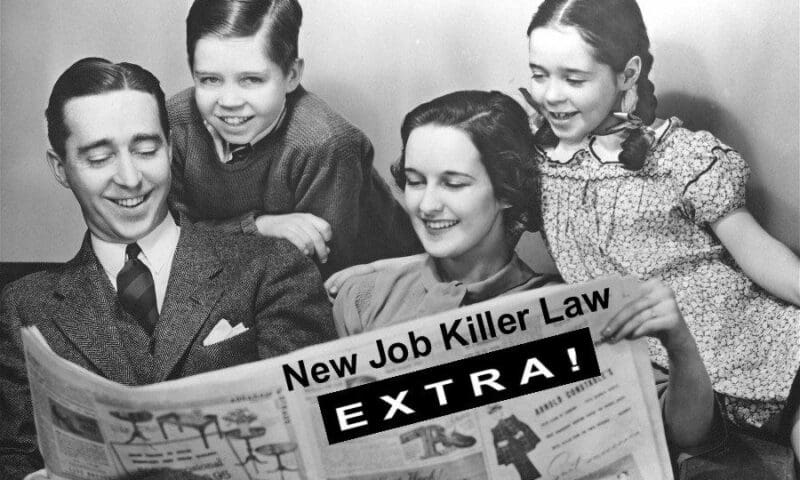
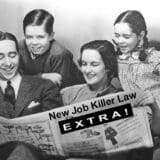
(Editor’s Note: The following executive summary comes from a study partly funded by the Public Welfare Foundation and the Ford Foundation, and is used by permission.)
An independent study released by two prominent scholars found that number of news stories with “job killer” allegations have increased by 1,156 percent between the first three years of the George W. Bush administration and the first three years of the Obama administration.
The study, “Job Killers” in the News: Allegations without Verification, by Professors Peter Dreier of Occidental College and Christopher R. Martin of the University of Northern Iowa, revealed that the “job killer” allegations came most often from Republican and business group sources, and were targeted at policies to safeguard consumers, protect the environment, raise wages, expand health insurance coverage, increase taxes on the wealthy, and make workplaces safer.
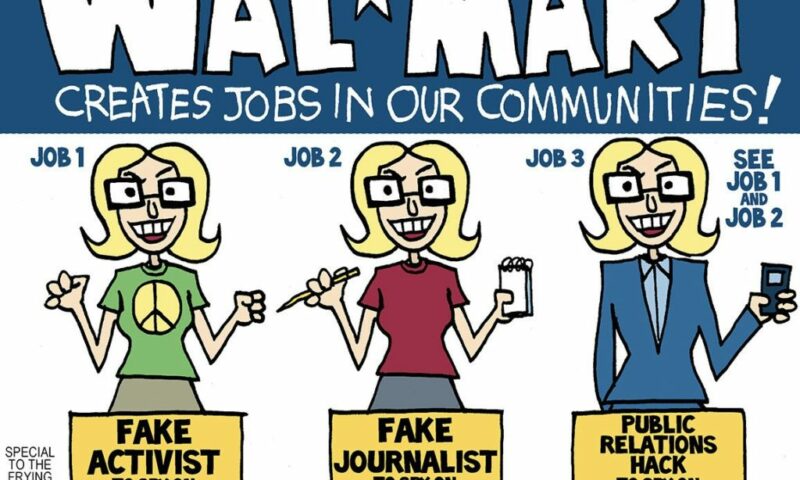
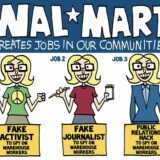
» Read more about: Lalo Alcaraz on Walmart's Fakes and Hacks »